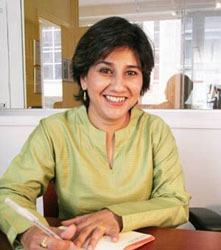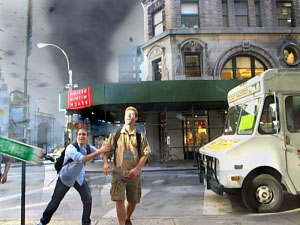Using Social Media for Social Change: Mallika Dutt
With nearly one-tenth of the world’s 7 billion people connected with each other through online social strings, social media fad has almost reached its frothy peak. While online social games are among the biggest baits to attract crowds on social media sites, here’s a global human rights organization — Breakthrough — that wants to leverage the pervasive reach of such games to see social change in the society. Is it possible?
Let’s ask Breakthrough president Mallika Dutt. In this exclusive interview with Rakesh Raman, managing editor, Raman Media Network, Mallika will lead us in the contemporary social media universe.
It’s here:
1. Social media is supposed to be useful only for those brands that target gullible youngsters. Can it also be useful for dealing with serious issues such as racial discrimination, freedom of expression, corruption and human rights?
Absolutely. From the role Facebook and Twitter played in the Egyptian revolution to the It Gets Better campaign on YouTube, it has become overwhelmingly clear that social media is a serious — and effective — tool for connecting people and their ideas. Social media has taken the public square virtual — and organizing, debate and dialogue are unfolding online in real time.
A great example of this is the international conversation that has erupted on Twitter around the death of Osama Bin Laden. A simple series of hashtags are connecting millions of people around the globe to share their thoughts, critiques and analysis, empowering more voices to join the conversation than ever before.
2. Which factors are taken into consideration before deciding to launch an awareness campaign using social media or social games?
One of the most important factors to consider is your intended audience. Do you want to reach “power” users and “hardcore” gamers who can be activated as thought leaders? Or do you want to reach out directly to as broad and diverse an audience as possible? Both are sound strategies.
[ Also Read: 5-Point Formula for Anna Hazare to Kill Corruption ]But — for example — in the case of our new social game for human rights, America 2049, we opted for the latter, and chose to launch the game on Facebook. Facebook has over half a billion users — over half the US population over 12 years old — and is one of the most accessible platforms for games and information-sharing. In order for America 2049 to help spark national dialogue and the possibility of sustained change, it was essential for the game to reach beyond the gaming community to the broader public.
3. It’s believed that popular social games on social networking sites are largely time-wasters and mostly played by idle people. Is it possible to attract them toward these serious issue-based games? Or which is the right user group for such games?
I certainly feel that it’s more likely for a middle school student to play a human rights video game on Facebook than it is for her to pick up the United States Periodic Review on Human Rights report.
That’s exactly why social games have such potential for social change: they’re inviting, accessible, and fun. They reach people where they are. They allow people to experiment. And alternate reality games in particular allow players to immerse themselves in a “safe” space where they are free to solve problems, change identities, re-examine beliefs, and discover new empathies.
[ Also Read: Wanted: Facebook Gamers for Japan Disaster Relief ]Our hope is that reaching newer and younger audiences in the spaces where they already communicate and engage will awaken a sense of interest and shared responsibility around issues critical to their lives, and their futures.
4. Can digital media (or social media) be helpful for conveying your message across the communities, as most of them are on the wrong side of the digital divide (they don’t have access to digital technologies)?
It’s an important question to consider. As much as it seems that “everyone” is on Facebook, in fact, worldwide, everyone is not on Facebook. Speaking about Breakthrough in particular, that is in part why we use large varieties of media, arts, and pop culture — along with direct mobilization of individuals and communities — to achieve the widest possible reach and potential for transformation.
[ Also Read: Peepli Dead: True Story of Cyber Zombies in India ]Still, it can’t be denied that — for better and for worse — digital culture drives, shapes, and frames the wider, offline culture. So those of us who seek to transform culture as a whole should do what we can to focus on “for better.”
5. Is there any empirical method to measure the impact of social media campaigns or social games on the target audience?
Monitoring and evaluation are a critical piece of game development. Without traceable results, social media might be considered a “trend” or “phenomenon,” but not a tool for concrete change. So there are indeed a number of ways to determine the reach and impact of one’s campaigns. In America 2049, for example, Breakthrough tracks knowledge gain and attitude shifts through a series of evaluation questions that are embedded into gameplay as a seamless part of the story.
[ Also Read: IBM Offers Cloud-Based Social Media Analytics ]The questions serve to document changes in player attitudes and awareness on the issues highlighted throughout the game. More generally, game analytics help us, and others, track the number of players and where they’re playing (one of our largest non-U.S. audiences is in Indonesia). For another example, with ICED: I Can End Deportation, the first 3-D social change game, which we produced in 2007, pre- and post-game evaluations showed that the game succeeded in significantly shifting players’ attitudes about immigration and immigrants‘ rights in the U.S.
6. Can new media (Web, mobile, etc.) be as effective as traditional media (TV, newspapers, radio, etc.) for mass communications around social issues? If yes, what’s the right approach to use new media?
Absolutely. But we need to remember what differentiates social media from traditional media, and understand that social media is not a broadcast system. It is a tool for conversation and communication, interaction and connection. Social media can help hold traditional media accountable; social media can make traditional media come alive. Used effectively, social media is not just a new way to talk about issues of import; it is a way to change the way we talk about issues of import. As such, it has the power, directly or indirectly, to activate, engage, and even transform us all.
Mallika Dutt (pictured above) is founder and president of Breakthrough, a global human rights organization that uses the power of pop culture, arts, and media to advance social change. Breakthrough’s projects include the anti-domestic violence campaign Bell Bajao (Ring the Bell) and the new multimedia Facebook game for human rights, America 2049.
————————————————————————————————————————————————–
[ Also Read: Sara Bordo, president and co-founder of NowLive, believes we are already experiencing a major tech-led shakeout in the global markets. Full Interview ]————————————————————————————————————————————————–
💛 Support Independent Journalism
If you find RMN News useful, please consider supporting us.




